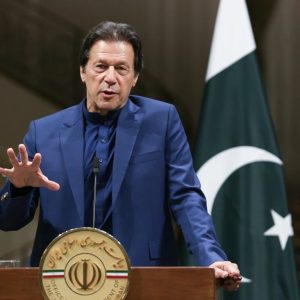Pakistan’s government plans to file treason charges against imprisoned former Prime Minister Imran Khan for wrongfully dissolving parliament in 2022 and to ban his political party for allegedly receiving foreign funding, the information minister said Monday.
The moves are certain to deepen the country’s political turmoil, which began after Khan’s 2022 ouster in a no-confidence vote in parliament. Khan, the main rival of current Prime Minister Shehbaz Sharif, remains a popular figure despite a series of criminal cases against him that he and his supporters say are politically motivated.
Khan’s spokesman said the government’s latest moves are a desperate response to recent court verdicts throwing out previous convictions against Khan, and an independent human rights commission urged the government to withdraw the plans.
Information Minister Attaullah Tarar said the government would file treason cases against Khan, former President Arif Alvi, and then-Deputy Speaker Qasim Suri for wrongfully dissolving the National Assembly in April 2022 during Khan’s final days in power.
Tarar also said the government has “credible evidence” that Khan’s Pakistan Tehreek-e-Insaf has received money from people and groups overseas, which is banned under Pakistani law. The government also accuses the party of inciting nationwide riots following Khan’s arrest last year.
Tarar said the allegations against the party allow the government to ban it under Pakistan’s Constitution, but that the decision would be referred to the Supreme Court for its approval.
Khan’s spokesman Zulfiqar Bukhari said the government’s moves to ban PTI are politically motivated. “This is a sign of panic as they have realized the courts can’t be threatened and put under pressure,” he said, adding that the government’s latest moves show that the country is “under soft martial law.”
Monday’s announcement came two days after a court overturned convictions and seven-year sentences given to Khan and his wife. His supporters expected after the ruling that they would be released after almost one year in jail, but government authorities immediately arrested him again on charges related to last year’s riots.
The acquittal of Khan and his wife Bibi was related to the legality of their 2018 marriage. She was previously married to a man who claimed they divorced in November 2017, less than three months before she married Khan. Islamic law requires a three-month waiting period before a new marriage.
Bibi said they divorced in August 2017, and the couple insisted they did not violate the waiting period.
The country’s independent Human Rights Commission of Pakistan said it was shocked by the government’s decision to ban the PTI, and said the decision should be withdrawn. “If pushed through, it will achieve nothing more than deeper polarization and a strong likelihood of political chaos and violence,” the commission said in a statement.
Khan has blamed his removal on the United States and the powerful military, which has ruled Pakistan for half of its history since its independence from British colonial rule in 1947.
The U.S., Sharif, and the military have denied Khan’s claim.
Last year’s violence subsided only when the Supreme Court ordered Khan’s release. However, he was again arrested in early August 2023 after a court handed him a three-year prison sentence on corruption charges.
In recent months, Khan has been acquitted in several cases related to last year’s violence, but his bail was canceled this week in connection with one case pending in the eastern city of Lahore.
On Friday, the Supreme Court ruled that Khan’s party was improperly denied at least 20 seats in parliament, in a significant blow to the country’s fragile governing coalition.
Adding 20 seats would bring the party’s strength in the parliament to 106 in the 336-seat National Assembly, but that would not pose any danger to the ruling coalition because Khan’s party would need 169 votes to oust Sharif.
Khan’s party had previously been excluded from a system that gives parties extra seats reserved for women and minorities in the National Assembly, the lower house of parliament.
Tarar, the information minister, also accused Khan on Monday of trying to damage diplomatic relations between Pakistan and the United States by alleging that his ouster as prime minister was a U.S.-led plot that had been carried out by the military and his rivals, including Sharif, who became prime minister after elections on February 8 which Khan says were rigged.

































